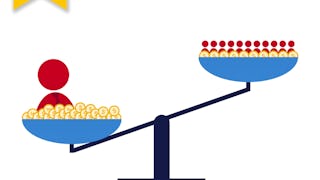Filter by
SubjectRequired
LanguageRequired
The language used throughout the course, in both instruction and assessments.
Learning ProductRequired
LevelRequired
DurationRequired
SkillsRequired
SubtitlesRequired
EducatorRequired
Explore the Democracy Course Catalog
 Status: Free
Status: FreeJohns Hopkins University
Skills you'll gain: Political Sciences, Policy Analysis, Social Justice, Social Sciences, Public Policies, Game Theory, Demography, Logical Reasoning, Applied Mathematics
 Status: Free
Status: FreeUtrecht University
Skills you'll gain: Lobbying, Social Justice, Political Sciences, Socioeconomics, Tax Laws, Social Sciences, Economics, Commercial Laws, Policy Analysis, Governance, International Finance
 Status: Free
Status: FreeYale University
Skills you'll gain: Political Sciences, Policy Analysis, Social Justice, Social Sciences, European History, Law, Regulation, and Compliance, Governance, Ethical Standards And Conduct, Socioeconomics, Economics

University of Michigan
Skills you'll gain: Cyber Security Policies, Security Engineering, Information Systems Security, Computer Security Awareness Training, Security Awareness, Vulnerability, Political Sciences, Policy Analysis, Public Policies, Public Safety and National Security, Safety and Security, Human Factors, Human Computer Interaction, Usability

Duke University
Skills you'll gain: Political Sciences, Policy Analysis, Social Sciences, Social Studies, Advocacy, Public Policies, Governance, Public Administration
What brings you to Coursera today?
 Status: Free
Status: FreeJohns Hopkins University
Skills you'll gain: Game Theory, Mathematical Modeling, Political Sciences, Combinatorics, Social Sciences, Probability, Applied Mathematics, Statistical Analysis
 Status: Free
Status: FreeLund University
Skills you'll gain: Data Ethics, Artificial Intelligence, Social Justice, Algorithms, Ethical Standards And Conduct, Information Privacy, Political Sciences, Emerging Technologies, Governance, Law, Regulation, and Compliance

University of Copenhagen
Skills you'll gain: International Relations, Political Sciences, Environmental Issue, Environmental Policy, Advocacy, Systems Thinking, Community Organizing, Environment, Social Sciences, Lobbying, Public Policies, Innovation, Governance

Emory University
Skills you'll gain: Public Health, Conflict Management, Public Safety and National Security, International Relations, Social Justice, Mental Health, Sociology, Mental and Behavioral Health, Social Sciences, Economics, Policy, and Social Studies, Media and Communications, Trauma Care, Biology

Università di Napoli Federico II
Skills you'll gain: Political Sciences, Media and Communications, Ancient History, Social Justice, Social Sciences, Economics, Policy, and Social Studies, European History, Public Policies, Sociology, World History, Governance

Università di Napoli Federico II
Skills you'll gain: Political Sciences, Policy Analysis, Social Sciences, International Relations, Public Policies, Systems Thinking, Governance, Research Methodologies, Qualitative Research
 Status: Free
Status: FreeUniversity of London
Skills you'll gain: Law, Regulation, and Compliance, Court Systems, Business Ethics, Social Justice, Environmental Social And Corporate Governance (ESG), Legal Proceedings, Case Law, International Relations, Legal Research, Political Sciences, Governance
What brings you to Coursera today?
Democracy learners also search
In summary, here are 10 of our most popular democracy courses
- The Mathematics of Democracy, Politics and Manipulation: Johns Hopkins University
- Inequality and Democracy: Utrecht University
- Moral Foundations of Politics : Yale University
- Securing Digital Democracy: University of Michigan
- Civic Engagement in American Democracy: Duke University
- Mathematics and Democracy Teach Out: Johns Hopkins University
- Artificial Intelligence: Ethics & Societal Challenges: Lund University
- Making Democracy Fit for Climate: University of Copenhagen
- Understanding Violence: Emory University
- Introducción a la teoría política: Università di Napoli Federico II










